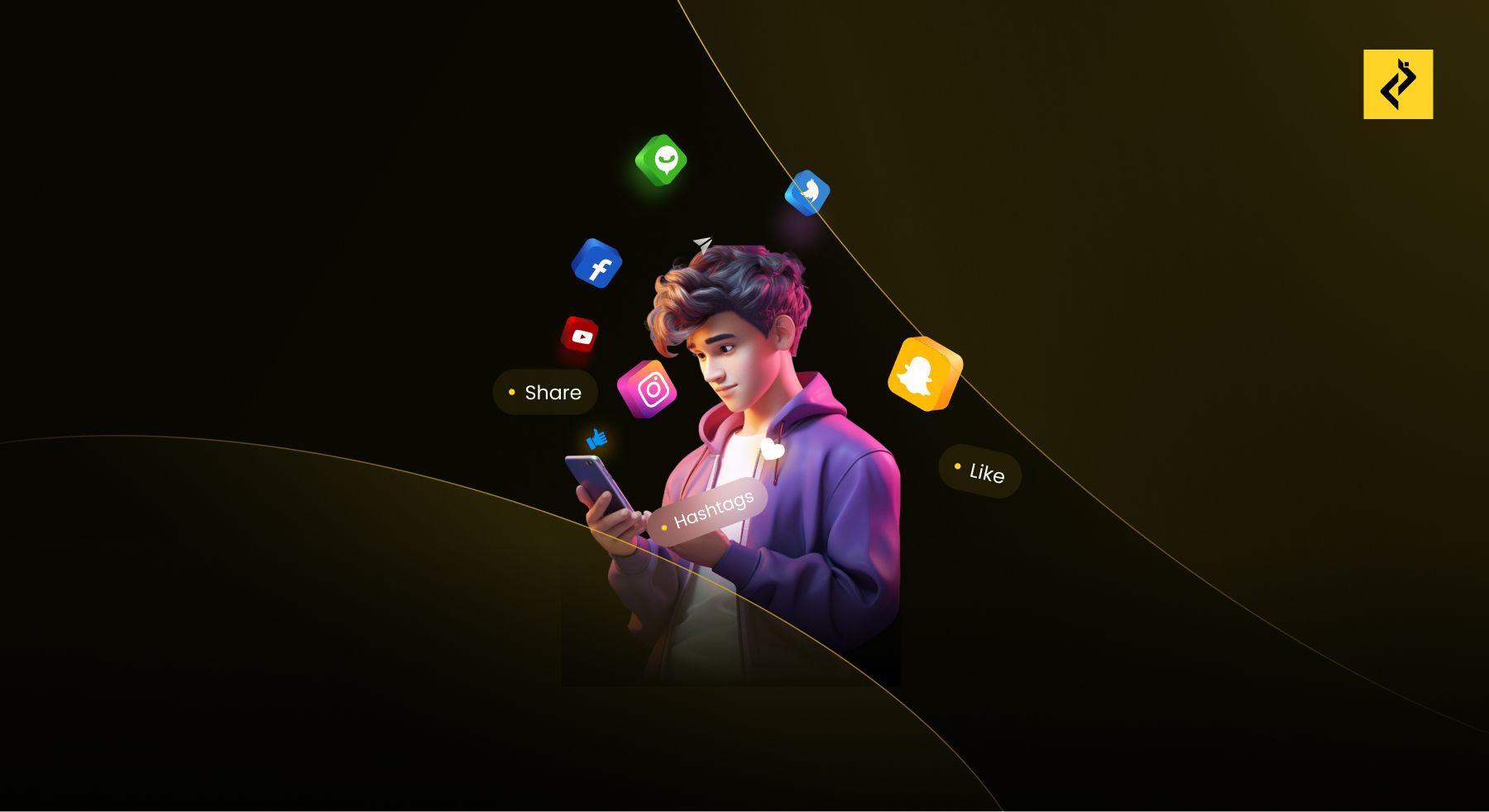Digital Detox or Doomscrolling: The Social Dillema
Saranya M S
January 4, 2025
6 Min read

Did you know that the average person spends over 2.5 hours daily on social media? That’s nearly 17.5 hours a week, equivalent to two full waking days lost in the digital world. As we enter a new year, many of us set resolutions to improve our health, relationships, and productivity. But have you considered making a resolution to reclaim control over your screen time? Recent studies suggest that 50% of teenagers and nearly 30% of adults have a social media addiction. Beyond personal anecdotes, the data reveals a growing unhealthy dependence on digital screens that’s shaping our lifestyles and well-being.
In an era where notifications constantly compete for our attention, social media has become a double-edged sword. It keeps us connected and informed but also subtly draws us into a loop of compulsive usage. The endless scroll of curated content, the dopamine hit from likes, and the fear of missing out (FOMO) are not just features; they’re carefully designed tools to hook users, which develops social media addictionl.
This digital dilemma affects everyone, regardless of age or background. While technology enhances our lives in countless ways, unchecked screen time and social media addiction can take a toll on mental health, physical well-being, and personal relationships. As we plan our goals for the year ahead, the question is how do we strike a balance?. Pixbit Solutions, the leading social media marketing agency in Dubai has the solution for this!
Why Is Social Media So Addictive?
Social media platforms are meticulously crafted to keep users engaged. Algorithms track your behavior, interests, and interactions to provide a tailored experience that keeps you scrolling. Here’s why these platforms are so hard to resist:
-
Doom Scrolling: Unlike traditional media, social media offers endless feeds of content, ensuring there’s always something new to see. The addictive nature of this design often leads users to spend excessive amounts of time scrolling, consuming an overwhelming mix of uplifting, distressing, and trivial content.
-
Rewards System: The human brain releases dopamine, a feel-good chemical, in response to likes, comments, and shares. This creates a feedback loop that reinforces the habit.
-
Fear of Missing Out (FOMO): The constant updates from friends, celebrities, and influencers fuel a sense of urgency to stay connected. Social Validation: The need for external affirmation through likes and comments can become addictive, influencing self-worth.
When Habit Becomes Addiction
A quick scroll to kill time can evolve into hours of compulsive engagement. Signs that a casual habit is turning into a social media addiction include:
- Feeling irritable or anxious when unable to check social media.
- Spending more time online than planned, often at the cost of sleep or responsibilities.
- Using social media as an escape from stress or negative emotions.
Recognizing these patterns is crucial for addressing the problem.
The Hidden Costs of Screen Time
- Physical Health Impacts: Excessive screen time doesn’t just affect your eyes; it impacts your overall physical well-being:
- Digital Eye Strain: Hours of screen exposure leads to dry eyes, headaches, and blurred vision. This phenomenon, known as "computer vision syndrome," is becoming increasingly common.
- Poor Posture: Prolonged use of devices can result in "tech neck," a condition caused by hunching over screens for extended periods.
- Sleep Disruption: The blue light emitted by screens suppresses melatonin, the hormone responsible for sleep regulation, leading to insomnia and poor-quality rest.
- Mental Health Consequences: Social media doesn’t just occupy your time; it occupies your mind:
- Anxiety and Depression: Comparing your life to the curated, highlight-filled lives of others can lead to feelings of inadequacy and low self-esteem.
- Reduced Attention Span: Social media addiction conditions the brain for constant stimulation, making it harder to focus on tasks that require sustained effort.
- Loneliness Paradox: Despite its promise of connection, social media often fosters superficial interactions, leaving users isolated.
- Impact on Productivity and Relationships: The effects of excessive screen time ripple into personal and professional domains:
- Time Drain: Hours spent scrolling through content leave less time for meaningful activities.
- Work Disruptions: Constant notifications and distractions make it difficult to concentrate on tasks, lowering productivity.
- Strained Relationships: Over-reliance on virtual communication can weaken real-world connections, causing friction in personal relationships.
When to Recognize the Need for a Digital Detox
Are you unsure whether you need a break from your devices? Consider these indicators:
- You spend most of your free time on social media, even when you plan to do other things.
- You feel restless or irritable if you’re away from your phone for too long.
- Your physical or mental health has started to decline, yet you can’t seem to cut back on screen time.
- You’ve noticed that your personal or professional relationships are suffering due to your constant digital engagement.
These signs highlight the importance of reevaluating your relationship with technology.
Practical Steps for a Digital Detox
- Set Boundaries: Creating limits around screen time is essential:
- Designate specific times for social media use, such as after work or during breaks.
- Establish phone-free zones in your home, like the bedroom or dining area.
- Practice Mindful Use: Rather than mindlessly scrolling, engage with social media intentionally:
- Unfollow accounts that provoke negative emotions or don’t add value.
- Prioritize meaningful interactions over passive consumption.
- Replace Screen Time with Real-World Activities: Rediscover the joys of offline living by:
- Engaging in hobbies like painting, gardening, or playing a musical instrument.
- Spending time outdoors—whether it’s a brisk walk, a hike, or a picnic with friends.
- Gradually Reduce Usage: Going cold turkey can be overwhelming. Instead:
- Use apps like Freedom or StayFocusd to block access to social media during work hours.
- Gradually reduce screen time by setting achievable daily limits.
- Develop a Relaxing Night time Routine: To improve sleep quality, create a calming pre-bed routine:
- Avoid screens at least an hour before bedtime.
- Opt for activities like reading a physical book, meditating, or journaling to wind down.
The Benefits of a Digital Detox
- Mental Clarity: A break from screens helps reset your mind, improving focus and creativity.
- Improved Physical Health: Less screen time reduces eye strain, corrects posture, and enhances sleep quality.
- Stronger Relationships: Quality face-to-face interactions deepen bonds and foster trust.
- Reclaimed Time: A detox frees up hours for hobbies, learning, or simply relaxing.
- Enhanced Productivity: With fewer distractions, you can approach work and personal projects with greater efficiency.
Digital Detox as a Lifestyle
A digital detox isn’t about abandoning technology altogether. Instead, it’s about creating a healthy balance that lets you enjoy the benefits of technology while minimizing its downsides. Start small by setting boundaries and gradually incorporate mindful habits into your daily routine. Over time, you’ll find that you’re more present in your interactions, more productive in your work, and more connected to your inner self. Breaking free from the grips of social media and excessive screen time isn’t just about detoxing—it’s about rediscovering a life filled with purpose, joy, and genuine connection. As the leading social media marketing agency in Dubai, Pixbit Solutions understands the need for a healthy social media usage pattern and screen time.
Conclusion
In a world where digital distractions are at every turn, it’s easy to lose sight of the real world around us. Social media addiction and excessive screen time don’t just affect our physical and mental health—they alter how we engage with life itself. As you set your New Year’s resolutions in 2025, consider prioritizing a digital detox, not as a rejection of technology, but as a conscious decision to reclaim your time, mental space, and overall well-being.
By setting boundaries and practicing healthy social media ,you can create lasting changes that improve your focus, strengthen your relationships, and enhance your quality of life. Over time, this balance will help you cultivate a deeper connection with loved ones, rediscover your passions, and lead a more intentional and fulfilling life.
Let 2025 be the year you take control of your digital habits and commit to living more purposefully. A digital detox isn’t just about limiting screen time—it’s about choosing a life enriched by genuine connections, self-care, and meaningful experiences. Let this resolution guide you toward a healthier, happier version of yourself in the year ahead.

Saranya M S
Content Writer at Pixbit Solutions
Share on
Have an idea that needs to go mobile? Launch it with us!
Have an idea that needs to go mobile? Launch it with us!
Let's Talk
Have an idea ?
Let's make it happen
Tell us your business aspirations, and let's craft a custom solution that drives business growth, ensuring satisfaction and exceeding your goals with precision.
Let's Talk